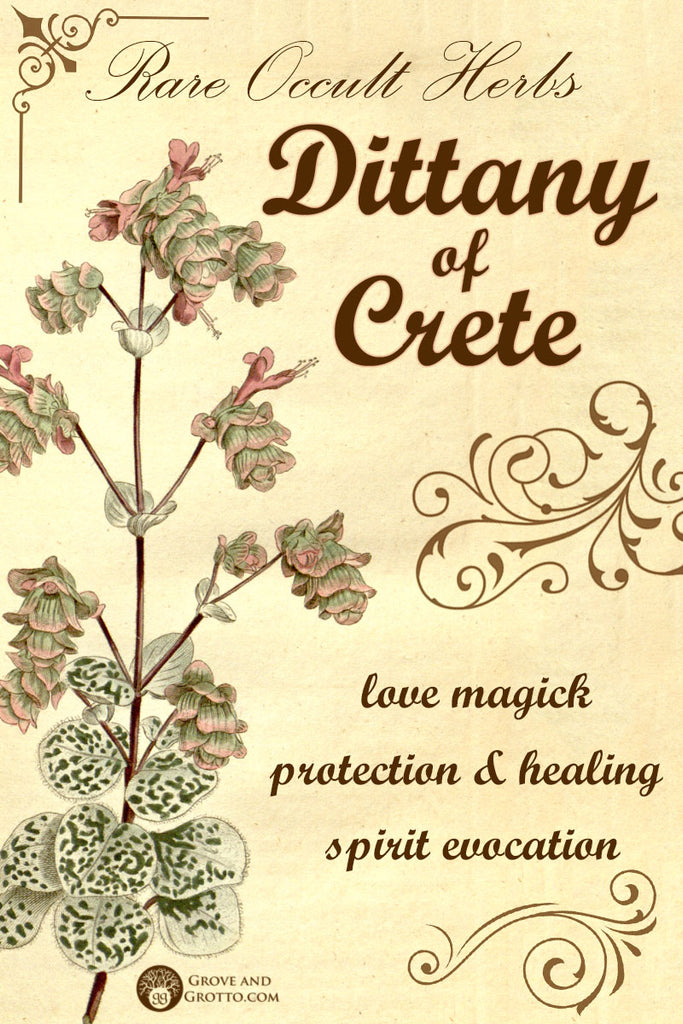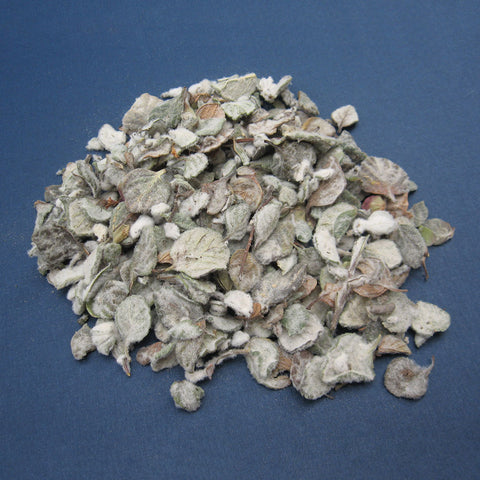
Dittany of Crete is a Mediterranean herb closely related to Marjoram and Oregano. But Dittany is not the kind of green stuff you put on roast chicken. Oh no. Its reputation as a magickal ingredient has far outgrown the stature of this unassuming little pot herb.
Dittany (the name probably comes from Dicte, the mountain range) grows wild only on the Aegean isle of Crete. Ever since ancient times, it has been prized as an aromatic, medicinal, and culinary herb.
Dittany is a small and fuzzy perennial, with beautiful pink flowers that appear in the summer. In Cretan tradition, it symbolizes love and is thought to be an aphrodisiac. The local name for Dittany is “Erontas,” referencing Eros. It grows only in the most inconvenient places—sunny outcroppings of mountains, on the sides of cliffs and gorges.
According to legend, intrepid young men would climb the hills in the summer to gather handfuls of the herb to offer as love tokens. They were known as “Erondades” (love-seekers). To obtain a bouquet of Dittany, it was said, you had to truly be in love.
In the Aegean region, Dittany was used to heal wounds, ease the pain of childbirth, flavor wine and liqueur, and make tasty sauces for fish. Virgil reported that injured wild goats would seek out the plant for healing. As Dittany’s reputation grew, legends stated that consuming the herb would cause injuries to heal immediately—even expel arrows from wounds, cause poison to leave the body, banish venomous snakes to their dens, etc., etc. While not a miracle cure, Dittany does have anti-microbial properties that can aid in healing.
Dittany of Crete is pretty much unavailable commercially. Its limited range makes it one of the most sought-after magickal herbs. It can be homegrown in warm climates. But it’s a pain in the butt to harvest, even when cultivated, and the yield is small. The wild stock is threatened, and it's rarely cultivated on anything close to a commercial scale. Essential oils are available, but that's not much help if you need the dried herb for a formula.
Be watchful of imposters: True Dittany of Crete (Origanum dictamnus) is easy to identify by its fuzzy, oval-shaped leaves. It does indeed resemble an especially large, especially hairy Oregano. Another plant, Dictamnus alba ("Dittany," "Burning Bush," or "Gas Plant") is substituted in some occult shops. But it is similar in name only. (No comment on those vendors who sell plain old Oregano as Dittany of Crete.)

Due to customer demand, we are now importing small amounts of dried Dittany of Crete directly from a grower in Greece. I expect to have it listed in the shop by the end of April. It won't be cheap, but there is really no substitute for Dittany of Crete for purists. (Update: It's here!)
Magickal Uses of Dittany of Crete
Textual references to Dittany are rare, despite its centuries of use. Agrippa mentions it only as a Solar herb, alongside the more familiar Ginger, Cedar, and Marigold.
In European folk magick, Dittany is regarded as a consummate love herb. Feeding it to your intended is supposed to cause them to fall irretrievably in love with you. Sicilian women, according to an anecdote from catherine yronwode, use Dittany to work “sorcerous love magic.” Some spells with Dittany may have been passed down through the oral traditions of Italian folk magick. Still, the herb was virtually unheard-of in the Americas until at least the 1940s.
In Western ceremonial magick, Dittany of Crete is regarded as one of the best herbs for causing spirits to manifest. Dittany is burned in generous amounts and the spirits appear in the smoke. Aleister Crowley describes such a working in Magick Without Tears. He in turn refers to Helena Blavatsky, who once named Dittany as the most magickal of herbs. It is also used to create a favorable environment for trance work and astral projection.
In the Harry Potter series, Hermione uses Dittany of Crete for the instant healing of wounds.
Spells and Formulas with Dittany of Crete
Dittany of Crete is used for astral projection, spirit evocation and manifestation. Burn it over charcoal, mixed with Sandalwood incense or Frankincense for protection.
From Scott Cunningham: "The juice of the dittany drives away venomous beasts, so smear some onto your body before venturing out where they live.” This is probably related to the earlier belief that Dittany of Crete cures snakebites.
Add to love incenses to catch an astral vision of your future partner. You may substitute Dittany in love spells that call for Oregano. (Because the Oregano was probably substituted for Dittany of Crete.)
Correspondences of Dittany of Crete
I will take a page from Agrippa and 777 and assign this sun-loving perennial to the Sun. A secondary planetary correspondence would be Venus, especially when the herb is in flower.
There is no obvious elemental correspondence for Dittany of Crete. Most sources go with Water, given its sweetness and history as a brewing herb. It's a stretch but I guess I'll take it.
Precautions
Dittany is a culinary herb, and is generally safe to use. (Spirit evocation, on the other hand, is at your own risk.) Avoid Dittany of Crete if you are allergic to any Lamiaceae family plants such as Oregano, Basil, or Lavender.
Scent Profile: Aromatic, Herbaceous, Sweet
Correspondence: Sun/Venus, Water
Shop for herbs, read more about herbs, or check out all the articles.
